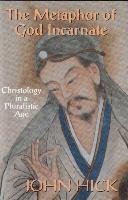London: SCM Press, Second Edition : 2005.

A sustained critique of the idea that Jesus was literally God as well as literally a man. Argues that Jesus himself did not teach what was to become the orthodox Christian understanding of him; that the Chalcedonian dogma of his two natures, human and divine, cannot be made coherently intelligible; that the alternative versions of kenosis and the contemporary two minds theory also fail; that the traditional dogma has been used to justify great human evils; that the idea of divine incarnation is better understood as metaphor (as in ‘Winston Churchill incarnated the British will to resist Hitler’); that we should see Jesus as unambiguously a human being who was so open to God that he makes God real to us; and that Christianity can then see itself as one major human response to the Ultimate among others. (Trans. Japanese, Chinese, Korean, Portuguese, Spanish.)
“John Hick is a professional theologian and philosopher of high stature. He researches thoroughly and writes beautifully. One can only admire his ability to communicate and his scholarly acumen. At the same time, Hick represents a threat to traditional Christianity. . . The book establishes the need for someone to vindicate the faith of the church in incarnation on the high level in which Hick does his critical work” (Prof. Clark Pinnock, Calvin Theological Journal).
"One may disagree with some of the conclusions of this most honest and open of theologians, but must admit that he has articulated the feelings of many serious Christians today, and sharply delineated many serious issues in the continuing debate about Christology which the Church cannot afford to ignore". (Tom Baker in the Church Times).
"John Hick takes with great seriousness the various conservative efforts to reaffirm literally traditional doctrines of incarnation and atonement. He rightly believes that most people continue to identify Christian faith with these doctrines, and that this does great harm. The book is a rigorous and sustained polemic against these doctrines and the arguments offered in their defence. Even one like myself, for whom the idea of incarnation is central, cannot but applaud the forcefulness of the attack on the ways of thinking that block the reconceptualization of Christian faith that is so badly needed" (John Cobb)
